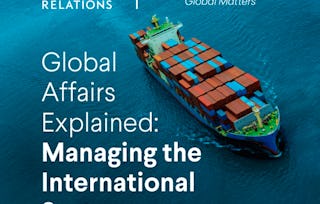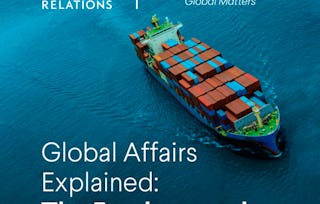The course offers a well-researched and broad-ranging primer to the United Nations system. Consisting of an introduction to the complex UN family and its history, and a series of ‘snapshots’ of key UN functions, which are used to explore important UN themes and help learners develop important analysis, communication, and policy-based skills.


Global Diplomacy: the United Nations in the World
Ends soon: Gain next-level skills with Coursera Plus for $199 (regularly $399). Save now.


Global Diplomacy: the United Nations in the World

Instructor: Dr Dan Plesch, SOAS University of London
101,057 already enrolled
Included with
(1,890 reviews)
Skills you'll gain
Details to know

Add to your LinkedIn profile
See how employees at top companies are mastering in-demand skills

There are 6 modules in this course
This initial week introduces the United Nations as a complex and evolving system of agencies and institutions designed to tackle global challenges, from peacekeeping and development to human rights and humanitarian aid. Through expert videos and key readings, you'll examine how these parts fit together, where they fall short, and what reform might look like in the 21st century.
What's included
3 videos5 readings2 assignments
This week will look at how and why the United Nations was created. You will learn about the key countries and groups involved, what early UN agencies did, and the values that shaped the UN from the beginning. We’ll also think about how these early ideas compare to the way the UN works today.
What's included
2 videos2 readings1 assignment
This week will use the UN Security Council as a primer to the issue of relative power in international institutions. After examining the structure and operations of the Council, it will encourage learners to explore the fundamental issues that determine its existence, including the status of the five permanent members, its ability to carry out its function, and the use and impact of the veto. Additional reading will also provide an introduction to the Council’s wider role in global peace and security, and how it has evolved, successfully and unsuccessfully, in response to international crises.
What's included
2 videos2 readings1 assignment
This week traces how the UN’s founding promise of “fundamental human rights” evolved into a living yet fiercely contested agenda: you’ll map the three families of rights set out in the Charter and Universal Declaration, meet the Human Rights Council and its independent experts, and unpack why enforcement remains political, shaped by state power and civil-society activism, before weighing whether this system can keep pace with new challenges.
What's included
2 videos2 readings1 assignment1 discussion prompt
This week will introduce the family of UN agencies involved in humanitarian work, and begin to unpack their relationships with each other and role in responding to conflict.
What's included
2 videos2 readings1 assignment
In this week, learners are invited to reflect on the key themes and debates covered throughout the course and to consider the future of the United Nations. The featured video encourages critical thinking about what lies ahead for the UN and how global challenges may shape its role. Alongside this, students can explore practical ways to engage with international organisations, from study and career paths to volunteer opportunities, providing a bridge between academic learning and real-world involvement.
What's included
2 videos2 readings
Instructor

Explore more from Governance and Society
 Status: Preview
Status: PreviewUniversity of London
 Status: Free Trial
Status: Free TrialCouncil on Foreign Relations
 Status: Free Trial
Status: Free TrialCouncil on Foreign Relations
 Status: Free Trial
Status: Free TrialCouncil on Foreign Relations
Why people choose Coursera for their career




Learner reviews
1,890 reviews
- 5 stars
78.21%
- 4 stars
16.97%
- 3 stars
3.43%
- 2 stars
1%
- 1 star
0.37%
Showing 3 of 1890
Reviewed on Dec 6, 2018
It was very interesting to get to know better about the UN structure and concepts, and it helped me a lot to get my first opportunity in an UN mission! Starting a new career. Thank you so much.
Reviewed on Jun 27, 2017
It is terrifically impressive course as I am Volunteering in UN since 2014 , I have been looking such kind of Course .Thanks again professors and SUAS team for giving this opportunity
Reviewed on Jun 8, 2022
It was an amazing jurney! I learned alot during the past 7 weeks. I will recommend this course for those who are interested in Global Diplomacy the United Nations in the World.
Frequently asked questions
To access the course materials, assignments and to earn a Certificate, you will need to purchase the Certificate experience when you enroll in a course. You can try a Free Trial instead, or apply for Financial Aid. The course may offer 'Full Course, No Certificate' instead. This option lets you see all course materials, submit required assessments, and get a final grade. This also means that you will not be able to purchase a Certificate experience.
When you purchase a Certificate you get access to all course materials, including graded assignments. Upon completing the course, your electronic Certificate will be added to your Accomplishments page - from there, you can print your Certificate or add it to your LinkedIn profile.
Yes. In select learning programs, you can apply for financial aid or a scholarship if you can’t afford the enrollment fee. If fin aid or scholarship is available for your learning program selection, you’ll find a link to apply on the description page.
More questions
Financial aid available,
¹ Some assignments in this course are AI-graded. For these assignments, your data will be used in accordance with Coursera's Privacy Notice.







